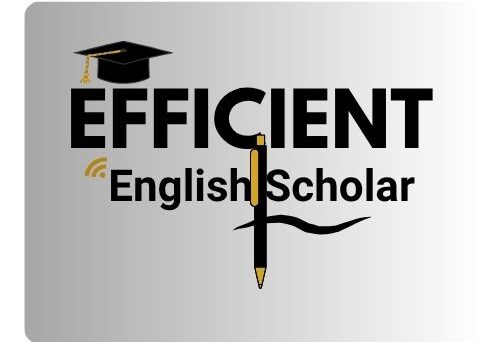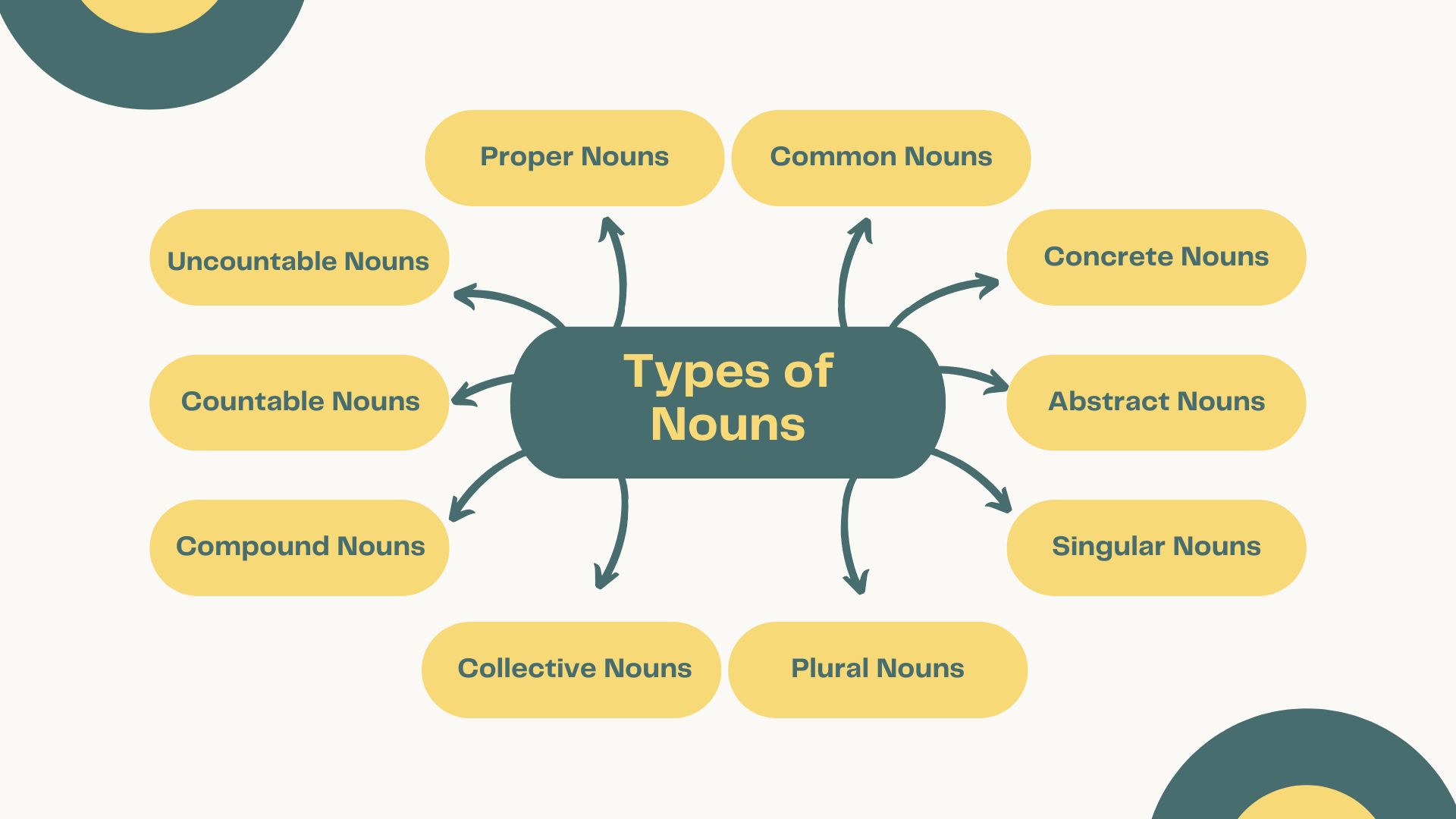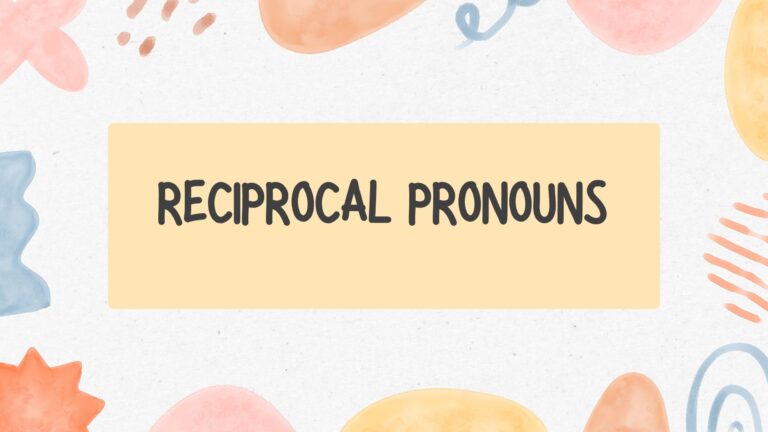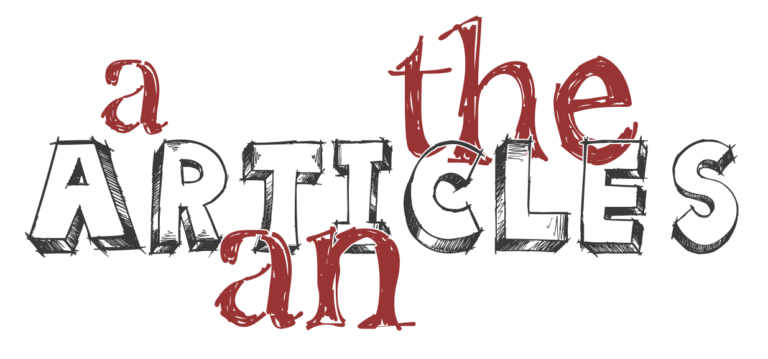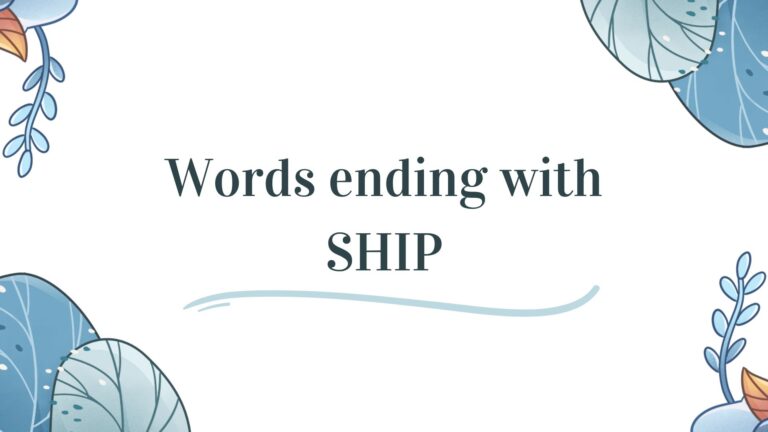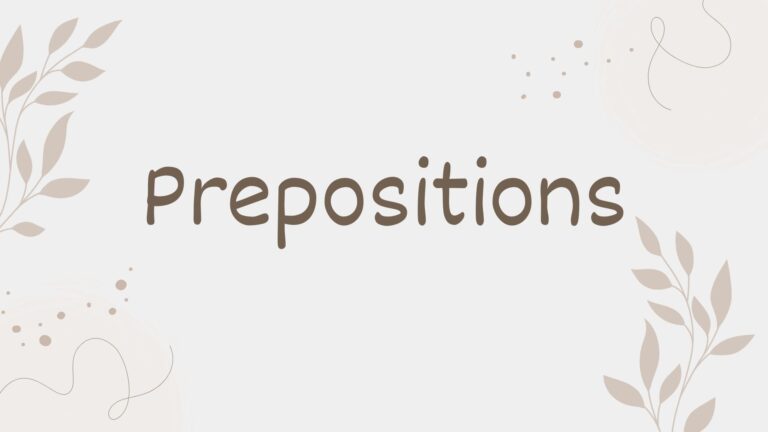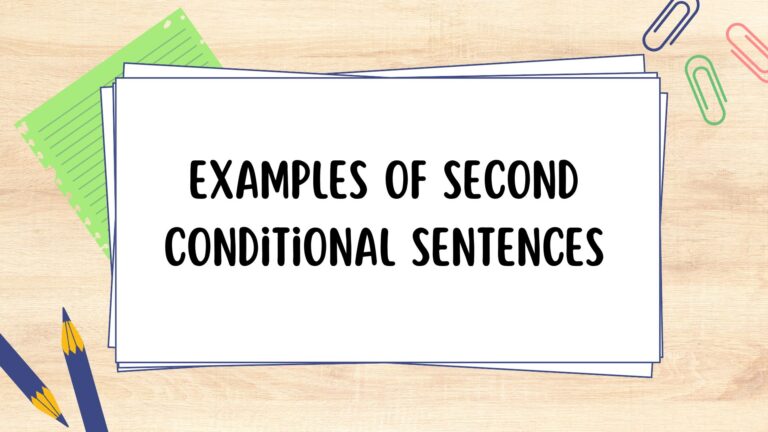Types of Nouns in English Grammar
Nouns are essential for expressing ideas and emotions. This article explores different noun types, including common and abstract, with examples for effective usage. By the end, readers will understand nouns’ diversity and enhance their language skills.
Introduction to Types of Nouns
Nouns are key to language because they name people, places, things, and ideas. Knowing the types of noun is important for good communication. Understanding these types helps us write and speak better, making our communication clearer and more engaging. Using different kinds of nouns improves how we share our thoughts.
Common Nouns
Common nouns are important for communication because they represent general items or ideas instead of specific ones. For example, “dog” includes all breeds, allowing us to talk about dogs without getting into details.
Words like “city” can bring different images to mind depending on personal experiences. This flexibility makes conversations more interesting and shows our cultural backgrounds.
Proper Nouns
Proper nouns identify specific people, places, and things, making communication clearer. For example, “Eiffel Tower” names a specific landmark, while “tower” is vague. They improve conversations by creating strong images. Each proper noun carries history and meaning, making them important for communication.
Proper noun also brings a sense of identity; mentioning “Shakespeare” connects us to a rich cultural history. This emotional connection enhances storytelling and builds audience relationships. As societies evolve, proper nouns change too, reflecting new brands and values.
Abstract Nouns
Abstract nouns describe feelings and ideas that we can’t touch, unlike concrete nouns. They encourage us to think about what is important beyond just physical things. For example, “freedom” means different things in different cultures.
Abstract noun also affects how we see the world and interact with others. For instance, “courage” means being determined, not just being fearless.
Concrete Nouns
Concrete nouns improve imagery by representing things we can see, touch, or hear. For example, saying “the fluffy orange tabby curled up on the sunlit windowsill” is much more vivid than simply saying “the cat.”
Concrete noun also helps explain abstract ideas, making them easier to understand. For instance, instead of just saying “freedom,” a writer might describe “a kite soaring high against a blue sky.”
Collective Nouns
Collective nouns group individuals or items into one unit, making communication clearer. Phrases like “murder” of crows spark curiosity and create vivid images of these birds’ behaviors. This unique language enhances vocabulary and makes conversations more interesting. The term “pod” for whales shows their complex social structures and emotional connections.
Compound Nouns
Compound nouns are made by joining words to create new meanings, such as “toothbrush.” They help us understand objects and ideas, showing how flexible language can be.
These change with culture and technology, like “smartphone,” which represents today’s multi-use devices.
Possessive Nouns
Possessive nouns show ownership by adding an apostrophe and often “s” to a noun. For example, “Sarah’s book” means the book belongs to Sarah. This helps clarify who owns what and improves understanding of relationships. Possessive noun also makes stories more vivid, like in “the cat’s whiskers,” which creates strong imagery.
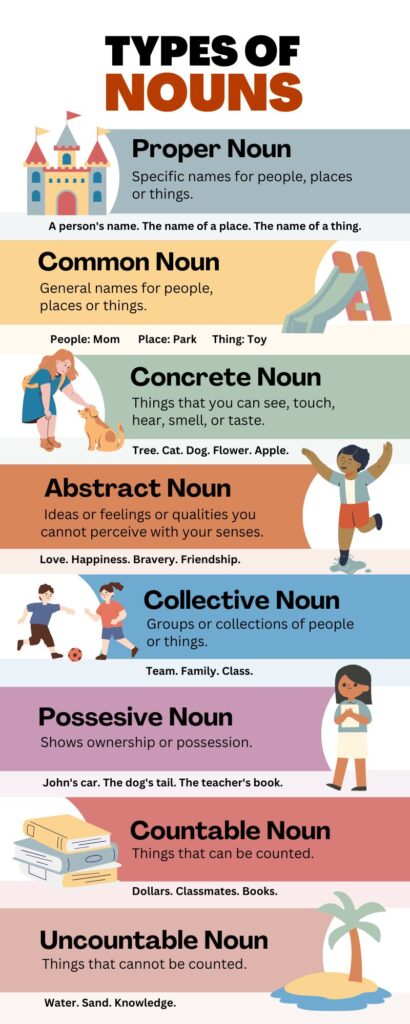
Examples of Each Nouns Type
| Common Noun | Proper Noun | Concrete Noun | Abstract Noun | Collective Noun | Countable Noun | Uncountable Noun |
| General names for people, places, or things | Proper names for people, places, or things | Things that can be seen, touched, smelled, heard, or tasted | Ideas, emotions, qualities – cannot be touched | A group or collection of people/animals/things | Can be counted individually | Cannot be counted directly |
| boy | JazzCash | kettle | boredom | gaggle (of geese) | apple | water |
| tree | Europe | chain | shame | pile (of clothes) | brush | milk |
| house | Burj Khalifa | ring | memory | string (of pearls) | flower | tea |
| river | Al-Jazeera | board | confusion | audience | camera | coffee |
| car | Wimbledon | basket | calm | forest (of trees) | story | sugar |
| school | Punjab | apple | laughter | horde (of tourists) | toy | salt |
| doctor | Netflix | chair | belief | cluster (of stars) | message | gold |
| teacher | Gmail | table | sorrow | brood (of chicks) | animal | boredom |
| girl | Musk | glass | joy | convoy (of trucks) | umbrella | research |
| shop | Elon | phone | desire | set (of tools) | plate | laughter |
| newspaper | Karachi | bag | ability | bundle (of sticks) | child | progress |
| bus | Shakespeare | spoon | excitement | troop (of monkeys) | watch | education |
| street | HBL | cup | talent | series (of events) | mirror | intelligence |
| animal | SnapChat | banana | habit | clump (of trees) | boat | sadness |
| paper | NUST | fork | surprise | heap (of stones) | boat | time |
| plate | Harry Potter | brush | generosity | stack (of chairs) | window | honesty |
| clock | Emirates | jeans | respect | bouquet (of flowers) | house | rice |
| star | Nestlé | car | dignity | litter (of puppies) | job | weather |
| drink | Honda | mug | loyalty | bevy (of girls) | banana | traffic |
| toy | Fawad Khan | wall | childhood | pod (of dolphins) | road | music |
| child | Pepsi | building | ambition | pride (of lions) | bag | anger |
| wall | TikTok | phone | hope | shoal (of fish) | pen | courage |
| computer | K2 | coin | calmness | fleet (of ships) | student | peace |
| park | Quaid-e-Azam | bus | intelligence | team | idea | cheese |
| song | Islam | brush | anxiety | library (of books) | coin | fear |
| movie | Quran | lamp | failure | pack | page | love |
| bag | computer | success | swarm | ball | beauty | |
| room | mirror | justice | pair | shirt | flour | |
| road | toy | kindness | troop | star | patience | |
| job | Jazz | pencil | pride | crew | car | baggage |
| light | Titanic | shoes | trust | board | shoe | hair |
| bed | January | shirt | care | panel | phone | luggage |
| shirt | Monday | clock | faith | bunch | bird | knowledge |
| pencil | Eid | fan | patience | gang | egg | news |
| city | New York | stone | courage | band | tree | advice |
| cup | Paris | pan | friendship | class | city | information |
| game | Coca-Cola | hat | love | flock | lamp | furniture |
| ball | Microsoft | door | knowledge | herd | person | oil |
| bird | Apple | bell | beauty | crowd | room | electricity |
| window | McDonald’s | bed | pain | army | key | sand |
| chair | YouTube | bottle | fear | committee | bus | gas |
| student | Ali | key | freedom | jury | dress | pollution |
| mountain | Amazon | water | wisdom | choir | fan | fuel |
| fan | ice cream | bravery | staff | spoon | soup | |
| garden | Toyota | cake | honesty | family | table | steam |
| food | Samsung | soap | peace | group | pencil | butter |
| dress | Oxford | flower | sadness | brood | chair | ice |
| table | Pakistan | bread | anger | troop of monkeys | book | smoke |
| phone | Asia | book | happiness | range of mountains | glass | air |
| book | Lahore | tree | death | bevy of girls | bottle | juice |
